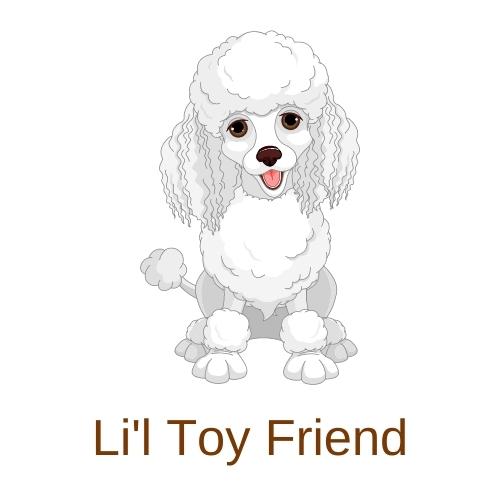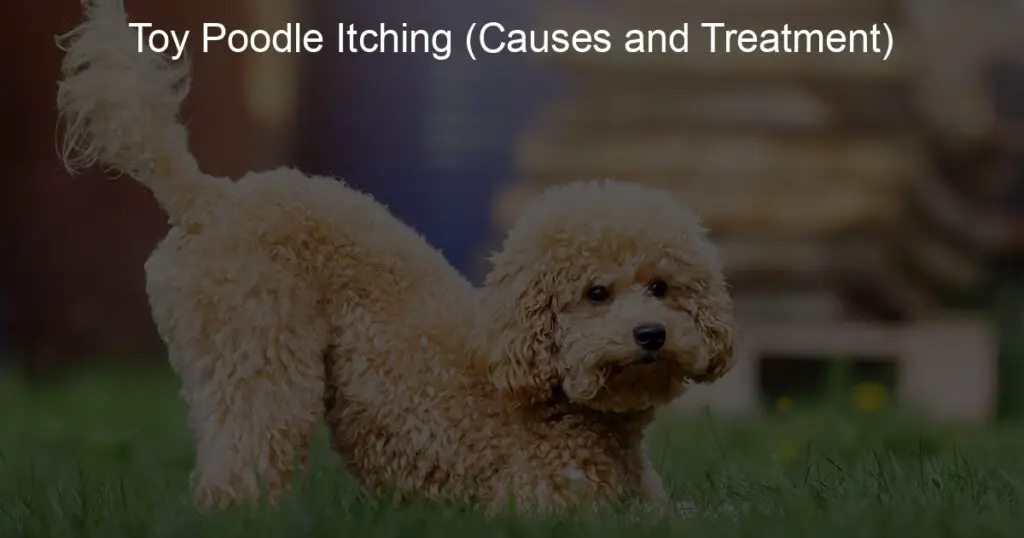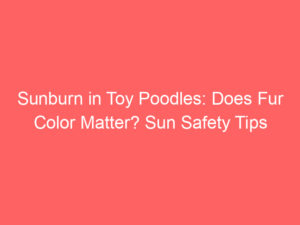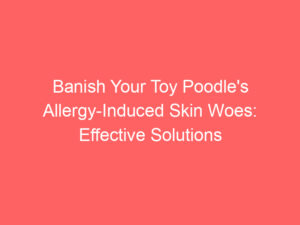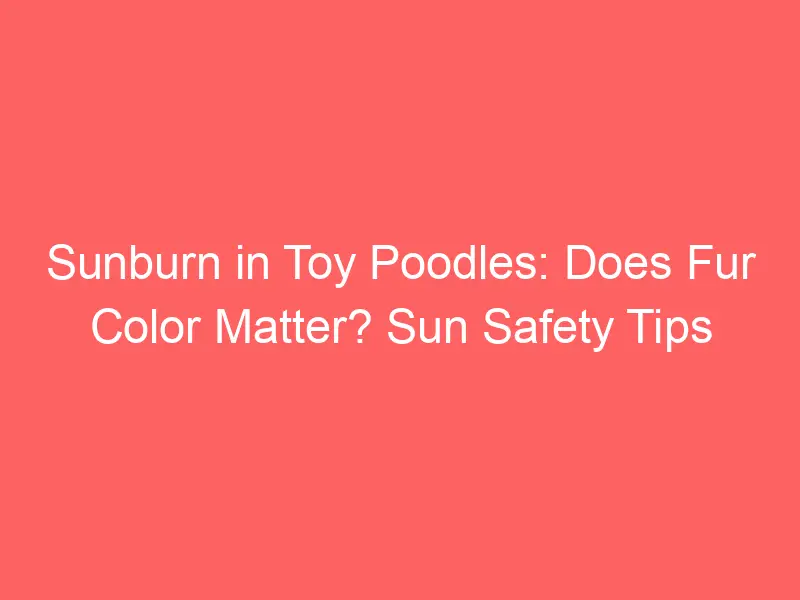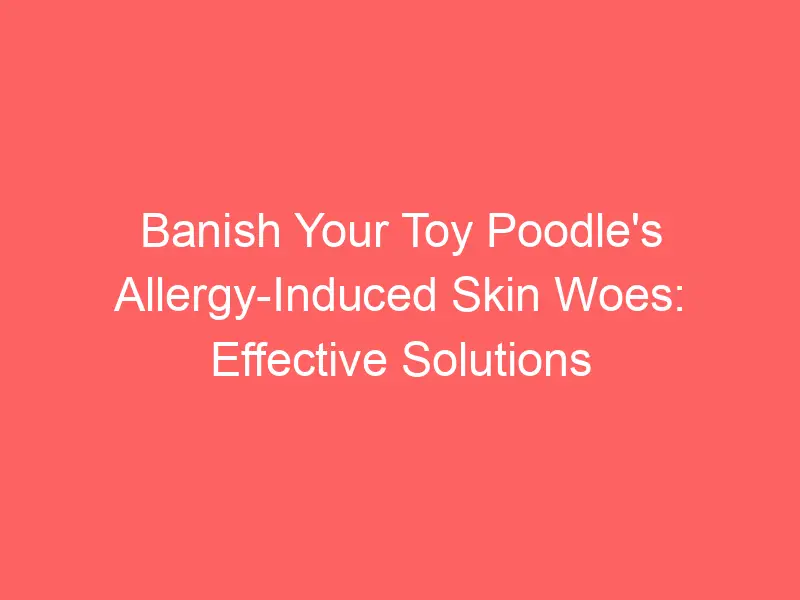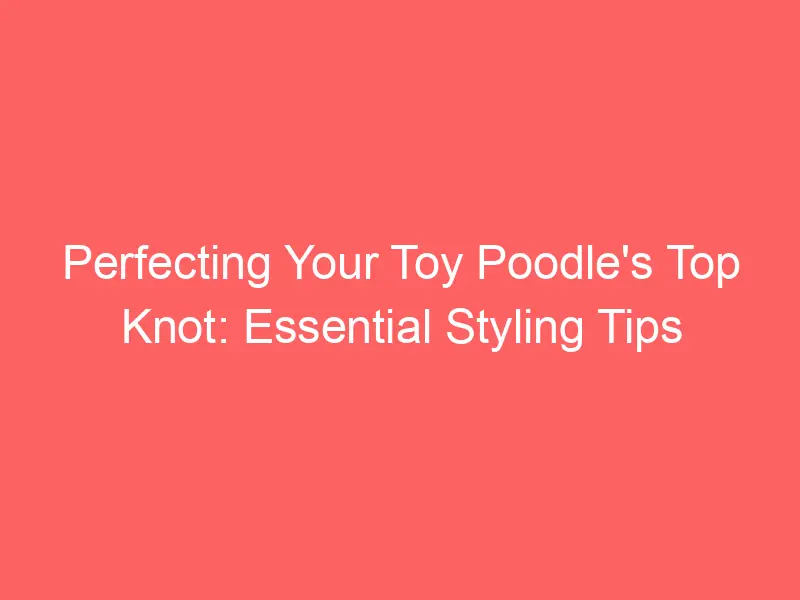Introduction

Welcome to our comprehensive guide on Toy Poodle skin problems. This article is designed to provide clear and informative content for all dog lovers, particularly those who own or are planning to own a Toy Poodle. We aim to shed light on the common skin issues these adorable pets may face and the importance of understanding the causes and treatments for itching.
-
- Overview of Toy Poodle Skin Problems
Toy Poodles, like any other breed, can suffer from a variety of skin problems. These can range from minor issues like dry skin and dandruff to more severe conditions such as allergies, infections, and parasitic infestations. Some of these problems can lead to itching, discomfort, and even pain for your furry friend. Understanding these issues is the first step towards ensuring the health and happiness of your Toy Poodle.
-
- Importance of Understanding Causes and Treatments for Itching
Itching in Toy Poodles can be a symptom of a variety of underlying issues. It’s not just an annoyance for your pet; it can also lead to more serious problems if left untreated. Persistent itching can cause your dog to scratch or bite their skin, leading to wounds, infections, and even permanent damage. That’s why it’s so important to understand the causes of itching and the available treatments. Armed with this knowledge, you can help your Toy Poodle live a comfortable and itch-free life.
In the following sections, we will delve deeper into the causes of itching in Toy Poodles, discuss various treatment options, and provide tips on how to prevent itching. So, let’s get started on this journey towards a healthier and happier life for your Toy Poodle.
Understanding Toy Poodle Skin
When it comes to understanding the skin of a Toy Poodle, it’s important to note that it has a unique structure. This structure not only gives the Toy Poodle its distinctive appearance but can also contribute to certain skin conditions.
Toy Poodle Skin Structure
The skin of a Toy Poodle is made up of three main layers: the epidermis, dermis, and subcutis. Each layer plays a crucial role in protecting the dog from environmental factors and maintaining overall health.
- Explanation of the unique skin structure of Toy Poodles: The outermost layer, the epidermis, is relatively thin but serves as a protective barrier against external elements. The middle layer, the dermis, is thicker and contains hair follicles, sweat glands, and blood vessels. The innermost layer, the subcutis, is made up of fat and connective tissue, providing insulation and cushioning.
- How this structure can contribute to skin conditions: Due to the unique structure of the Toy Poodle’s skin, they can be prone to certain skin conditions. For instance, the thin epidermis can make them more susceptible to irritants and allergens. Additionally, the dense hair follicles in the dermis can lead to conditions like folliculitis, where the hair follicles become inflamed.
Understanding the unique skin structure of a Toy Poodle can help owners better care for their pets and prevent potential skin issues. Regular grooming and veterinary check-ups are essential to maintain the health of your Toy Poodle’s skin.
Common Toy Poodle Skin Conditions
When it comes to the health of your Toy Poodle, their skin condition plays a crucial role. Here are some of the most common skin conditions that Toy Poodles may experience:
-
- Toy Poodle Dermatitis
Dermatitis is a condition that causes inflammation of the skin. In Toy Poodles, this can be due to a variety of factors, including parasites, allergies, or even certain types of fabrics. Symptoms of dermatitis in Toy Poodles include itching, redness, and sometimes even hair loss. It’s important to consult with a vet if you notice any of these symptoms in your Toy Poodle.
-
- Toy Poodle Allergies
Just like humans, Toy Poodles can also suffer from allergies. These allergies can be due to food, environmental factors, or even certain types of medications. Allergies in Toy Poodles can manifest as skin conditions, with symptoms including itching, redness, and swelling. If your Toy Poodle is showing signs of allergies, it’s important to identify the cause and treat it accordingly.
-
- Other Common Skin Conditions in Toy Poodles
Other common skin conditions in Toy Poodles include fungal infections, bacterial infections, and seborrhea. Fungal and bacterial infections can occur when the skin’s natural barrier is compromised, while seborrhea is a condition that causes flaky skin and dandruff. Regular grooming and vet check-ups can help prevent these conditions and keep your Toy Poodle’s skin healthy.
Understanding these common skin conditions can help you keep your Toy Poodle healthy and happy. Remember, if you notice any unusual changes in your Toy Poodle’s skin, it’s always best to consult with a vet.
Causes of Itching in Toy Poodles
Itching in Toy Poodles can be a distressing problem for both the dog and its owner. Itching, or pruritus, can be caused by a variety of factors. In this section, we will focus on the environmental factors that can cause itching in Toy Poodles.
Environmental Factors
Environmental factors can significantly impact the skin health of your Toy Poodle, leading to itching. Two of the most common environmental factors are the impact of weather and climate and the role of household allergens.
-
- Impact of Weather and Climate on Toy Poodle Skin
Weather and climate can have a significant impact on your Toy Poodle’s skin. For instance, cold, dry winters can lead to dry, itchy skin. On the other hand, hot, humid summers can promote the growth of yeast and bacteria, which can also cause itching. According to a study by veterinary experts, changes in weather and climate can cause skin problems in up to 10% of dogs.
-
- Role of Household Allergens in Causing Itching
Household allergens, such as dust mites, mold spores, and certain types of fabrics, can also cause itching in Toy Poodles. These allergens can irritate the skin, leading to inflammation and itching. A study published in the Journal of the American Veterinary Medical Association found that up to 15% of dogs may be allergic to common household allergens.
In conclusion, environmental factors play a significant role in causing itching in Toy Poodles. By understanding these factors, you can take steps to minimize their impact and keep your Toy Poodle comfortable and itch-free.
Dietary Factors
Toy Poodles, like all dogs, can suffer from a variety of health issues, including itchy skin. One of the most common causes of this problem is their diet. Let’s delve into how diet can contribute to itchy skin in Toy Poodles and the common food allergens they may encounter.
-
How diet can contribute to itchy skin in Toy Poodles
A balanced diet is essential for a healthy dog. However, some food ingredients can cause allergic reactions, leading to itchy skin. When a Toy Poodle consumes food that it’s allergic to, the body’s immune system reacts, causing inflammation and itching. For instance, a diet high in processed foods and grains can lead to skin issues. These foods often contain artificial colors, flavors, and preservatives that can trigger allergic reactions.
Moreover, a lack of certain nutrients, like Omega-3 fatty acids, can also contribute to dry and itchy skin. These fatty acids help maintain the skin’s natural oil barrier, keeping it hydrated and less prone to itching. Therefore, a diet deficient in these essential nutrients can lead to skin problems in Toy Poodles.
-
Common food allergens for Toy Poodles
Toy Poodles can be allergic to a variety of foods. However, some allergens are more common than others. These include:
- Dairy Products: Some dogs are lactose intolerant and can react to milk and other dairy products.
- Grains: Grains like wheat and corn are common allergens for many dogs, including Toy Poodles.
- Protein Sources: Certain proteins, such as beef, chicken, and fish, can also cause allergic reactions.
- Artificial Additives: Artificial colors, flavors, and preservatives found in processed dog foods can trigger allergies.
It’s important to remember that every Toy Poodle is unique, and what causes an allergic reaction in one may not affect another. If you suspect your Toy Poodle has a food allergy, it’s best to consult with a veterinarian. They can help identify the allergen and suggest a suitable diet plan.
Treatment for Toy Poodle Itching
If your Toy Poodle is constantly scratching, it’s important to find a solution quickly to prevent further discomfort or potential skin damage. Here are some medical treatments that can help alleviate your pet’s itching.
Medical Treatments
-
- Topical treatments for Toy Poodle dermatitis
Topical treatments are applied directly to your Toy Poodle’s skin. They can include creams, ointments, or sprays that contain ingredients to soothe the skin and reduce inflammation. Some topical treatments also contain medications to treat bacterial or fungal infections that can cause or worsen dermatitis. Always follow your vet’s instructions when using these treatments.
-
- Medications for treating Toy Poodle allergies
Just like humans, Toy Poodles can suffer from allergies that cause itching. These allergies can be to food, environmental factors like pollen or dust mites, or even to certain materials like plastic or rubber. Your vet may prescribe antihistamines or corticosteroids to help control your dog’s allergic reactions and reduce itching. In some cases, a change in diet or environment may also be necessary.
-
- When to seek veterinary care for your Toy Poodle’s itching
If your Toy Poodle’s itching is severe, persistent, or accompanied by other symptoms like redness, swelling, sores, or changes in behavior, it’s time to seek veterinary care. Your vet can perform tests to determine the cause of the itching and recommend the best course of treatment. Remember, it’s always better to seek help sooner rather than later to prevent your pet’s discomfort from escalating.
It’s important to remember that while these treatments can help manage your Toy Poodle’s itching, they may not cure the underlying cause. Always consult with your vet to ensure you’re providing the best care for your pet.
Home Remedies for Itchy Toy Poodles
If your Toy Poodle is scratching more than usual, it might be experiencing discomfort due to itching. While it’s always best to consult with a veterinarian, there are some home remedies you can try to help alleviate your pet’s discomfort.
-
- Natural Remedies for Relieving Itching
There are several natural remedies that can help soothe your Toy Poodle’s itchy skin:
-
-
- Oatmeal Baths: Oatmeal has anti-inflammatory properties that can help soothe your pet’s skin. Simply blend a cup of oatmeal into a fine powder, mix it with warm water, and let your dog soak in it for about 10 minutes.
- Coconut Oil: Coconut oil is known for its moisturizing and anti-inflammatory properties. You can apply a small amount of coconut oil directly to your dog’s skin to help relieve itching.
- Chamomile Tea: Chamomile tea can also be used to soothe your dog’s skin. Brew a strong cup of chamomile tea, let it cool, and then apply it to your dog’s skin using a spray bottle or a soft cloth.
- DIY Toy Poodle Skin Care Tips
-
Here are a few DIY skin care tips to help keep your Toy Poodle’s skin healthy and itch-free:
-
- Regular Grooming: Regular grooming can help keep your Toy Poodle’s skin clean and free from irritants. Make sure to use a gentle, hypoallergenic shampoo.
- Healthy Diet: A balanced diet can help keep your dog’s skin healthy. Make sure your Toy Poodle is getting the right nutrients, including Omega-3 fatty acids, which are known for their skin benefits.
- Hydration: Keeping your dog hydrated can also help maintain healthy skin. Make sure your Toy Poodle always has access to fresh, clean water.
Remember, these remedies and tips are not a substitute for professional veterinary care. If your Toy Poodle’s itching persists or worsens, it’s important to seek help from a veterinarian.
Preventing Itching in Toy Poodles
Preventing itching in your Toy Poodle is a crucial part of their overall health and happiness. This involves a combination of regular grooming and the use of appropriate skin care products. Let’s delve into these preventive measures in more detail.
Preventive Skin Care
Proper skin care can go a long way in preventing itching and other skin issues in your Toy Poodle. This involves two main aspects: regular grooming and choosing the right skin care products.
-
- Regular grooming practices for Toy Poodles
Grooming is not just about keeping your Toy Poodle looking good, it’s also about maintaining their skin health. Regular grooming can help remove dead skin cells, dirt, and other irritants that can cause itching. Brushing your Toy Poodle’s coat daily can help distribute natural oils, promoting healthier skin and reducing the likelihood of itching. Bathing should be done every 3-4 weeks with a gentle, dog-specific shampoo to avoid drying out their skin.
-
- Choosing the right skin care products for your Toy Poodle
Not all skin care products are created equal, especially when it comes to your Toy Poodle. It’s important to choose products that are specifically designed for dogs, as human products can often be too harsh for their sensitive skin. Look for dog shampoos and conditioners that are free from harsh chemicals and fragrances, as these can often cause irritation and itching. Products containing natural ingredients like oatmeal and aloe vera can be particularly soothing for itchy skin. Remember, it’s always best to consult with your vet before introducing a new skin care product to your Toy Poodle’s routine.
Dietary Prevention
One of the most effective ways to prevent itching in Toy Poodles is through a carefully planned diet. What your dog eats can have a significant impact on their skin health. Let’s explore some dietary strategies that can help keep your Toy Poodle’s skin healthy and itch-free.
-
Feeding your Toy Poodle a skin-friendly diet
Just like humans, dogs also require a balanced diet to maintain their overall health, including their skin. A skin-friendly diet for your Toy Poodle should include a mix of high-quality proteins, carbohydrates, fats, and essential vitamins and minerals. Foods rich in Omega-3 fatty acids, such as fish and flaxseeds, can help maintain healthy skin and coat. Additionally, foods high in Vitamin E and Biotin, like eggs and spinach, can also contribute to skin health.
Remember, every dog is unique, and what works for one might not work for another. It’s always best to consult with a veterinarian before making any significant changes to your dog’s diet.
-
Identifying and avoiding food allergens
Food allergies can often lead to skin problems in dogs, including itching. Common food allergens for dogs include beef, dairy, wheat, egg, chicken, lamb, soy, pork, rabbit, and fish. If your Toy Poodle is persistently itching, they might be allergic to something in their diet.
Identifying food allergens can be a bit tricky. It usually involves feeding your dog a special diet for a certain period and then gradually reintroducing potential allergens to see which ones trigger a reaction. This process, known as an elimination diet, should always be supervised by a veterinarian.
Once you’ve identified the allergens, the next step is to avoid them. This might involve switching to a hypoallergenic dog food or preparing home-cooked meals for your dog. Again, it’s crucial to consult with a veterinarian before making any drastic changes to your dog’s diet.
Conclusion
As we wrap up this comprehensive guide on Toy Poodle itching, it’s crucial to revisit some of the key points and insights we’ve discussed. Our furry friends rely on us for their wellbeing, and understanding their skin health is a significant part of that responsibility.
- Recap of the importance of understanding and addressing Toy Poodle itching: We’ve learned that itching in Toy Poodles can be a symptom of various conditions – from allergies to parasites, and even dietary issues. It’s not just a minor annoyance for your pet, but a sign that something might be wrong. Addressing this issue promptly can prevent further complications and ensure your Toy Poodle’s comfort and happiness. Wikipedia provides a wealth of information on general dog health that can be helpful in understanding your Toy Poodle’s needs.
- Final thoughts on maintaining your Toy Poodle’s skin health: Maintaining your Toy Poodle’s skin health is a continuous process. Regular grooming, a balanced diet, and routine vet check-ups are essential. It’s also important to be observant and responsive to any changes in your dog’s behavior or physical condition. Remember, a healthy skin means a happy Toy Poodle!
In conclusion, your Toy Poodle’s skin health should never be taken lightly. Itching, while seemingly a small issue, can be a symptom of a more serious underlying condition. By understanding the causes and treatments for this issue, you can ensure your furry friend’s comfort and overall wellbeing. After all, a healthy dog is a happy dog!
